|
|
|
Sort Order |
|
|
|
Items / Page
|
|
|
|
|
|
|
| Srl | Item |
| 1 |
ID:
129317
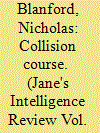

|
|
|
| 2 |
ID:
130939
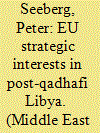

|
|
|
|
|
| Publication |
2014.
|
| Summary/Abstract |
Since the fall of Muammar Qadhafi in 2011, a legitimate monopoly over the means of violence has not been in the hands of the Libyan state. The military confrontation between the regime and what the international media called the "rebels," supported by the NATO no-fly zone, ended in October 2011. However, in 2012 and especially in 2013, Libya witnessed an escalating conflict pitting the democratically elected government and the Libyan state against armed groups and militias. For the EU, this is a challenge to its strategic interests, primarily security in the Mediterranean and secondarily migration and the development of Libya.
|
|
|
|
|
|
|
|
|
|
|
|
|
|
|
|
| 3 |
ID:
138050


|
|
|
|
|
| Summary/Abstract |
THE BAFFLED European and international media described the results of the May 2014 elections to the European Parliament as revolutionary. On the eve, there had been a lot of talk that the traditional parliamentary majority could be pushed aside; immediately after the elections, the result looked as a political earthquake of sorts.
|
|
|
|
|
|
|
|
|
|
|
|
|
|
|
|
| 4 |
ID:
129207
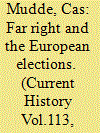

|
|
|
|
|
| Publication |
2014.
|
| Summary/Abstract |
If we are to believe the international media, this is going to be the year of the "far right anti-European populists." In the first three days of 2014, The New York Times published two opinion essays warning of the far right's rise, while The Economist focused its first issue of the year on "Europe's Tea Parties." Before this came months of public warnings of a "European populist backlash" issued by prominent European Union politicians, including the presidents of the EU, the European Commission, and the European Parliament (EP), and by national politicians, such as Italian Prime Minister Enrico Letta and Dutch Deputy Prime Minister Lodewijk Asscher. While the warnings have employed different terms and point to somewhat different groups
|
|
|
|
|
|
|
|
|
|
|
|
|
|
|
|
| 5 |
ID:
107410
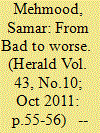

|
|
|
| 6 |
ID:
120150
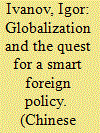

|
|
|
|
|
| Publication |
2013.
|
| Summary/Abstract |
Globalization continues to be a growing trend from the economy, security, and even the individual as ideas are rapidly exchanged between different cultures. State-actors, although still a critical component, are competing for influence with the private sector, transnational movements, international media, and even small NGOs. In this globalized world nations must adopt the concept of 'smart' foreign policy. The basic idea of 'smart' foreign policy is outlined in nine major points: focusing on the long term rather than short term opportunistic gains; separating domestic from foreign policy agendas; credibility; global intellectual leadership; enhancing the bureaucratic decision-making process to include all actors in the new globalized world; working more closely with the academic community; harmonizing public and private instruments of foreign policymaking; better educating societies on the concept and benefits of globalization; and finally, enhancing communication among all nations. These nine components of 'smart' foreign policy will help facilitate a better world where new opportunities can be discovered and greater progress can be made without the alienation of one group or nation.
|
|
|
|
|
|
|
|
|
|
|
|
|
|
|
|
| 7 |
ID:
111902
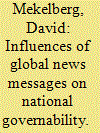

|
|
|
|
|
| Publication |
2012.
|
| Summary/Abstract |
The environment has been forced to the margins of Israeli political discourse in the past and has received little attention from formal institutes. Nevertheless, since the mid-1980s, environmental consciousness and public discourse have increased, mainly encouraged by Israeli civil society. This paper argues that since Israeli governmental and educational systems do not deal with environmental issues, the development of environmentalism in Israeli society is the outcome of a three-step process: first, an increase in the homogenization of cross-border messages; in turn this contributes to the homogenization of principles, norms, rules and decision-making procedures; and finally, plays a role in creating a greater sense of belonging to the global community. The paper probes the development of global environmental messages' influence on Israeli society and politics between the two first main UN environmental conferences of 1972 and 1992 by presenting a qualitative and quantitative analysis of The New York Times (USA), The Times (UK) and Ma'ariv and Yediot Ahronot (Israel) during the time of these conferences. A comprehensive survey is presented, along with interviews with representatives from 78 environmental NGOs in Israel that were established by 1995.
|
|
|
|
|
|
|
|
|
|
|
|
|
|
|
|
| 8 |
ID:
116105
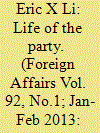

|
|
|
|
|
| Publication |
2013.
|
| Summary/Abstract |
In November 2012, the Chinese Communist Party (CCP) held its 18th National Congress, setting in motion a once-in-a-decade transfer of power to a new generation of leaders. As expected, Xi Jinping took over as general secretary and will become the president of the People's Republic this March. The turnover was a smooth and well-orchestrated demonstration by a confidently rising superpower. That didn't stop international media and even some Chinese intellectuals, however, from portraying it as a moment of crisis. In an issue that was published before the beginning of the congress, for example, The Economist quoted unnamed scholars at a recent conference as saying that China is "unstable at the grass roots, dejected at the middle strata and out of control at the top." To be sure, months before the handover, the scandal surrounding Bo Xilai, the former party boss of the Chongqing municipality, had shattered the CCP's long-held facade of unity, which had underwritten domestic political stability since the Tiananmen Square upheavals in 1989. To make matters worse, the Chinese economy, which had sustained double-digit GDP growth for two decades, slowed, decelerating for seven straight quarters. China's economic model of rapid industrialization, labor-intensive manufacturing, large-scale government investments in infrastructure, and export growth seemed to have nearly run its course. Some in China and the West have gone so far as to predict the demise of the one-party state, which they allege cannot survive if leading politicians stop delivering economic miracles.
|
|
|
|
|
|
|
|
|
|
|
|
|
|
|
|
| 9 |
ID:
118623
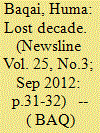

|
|
|
| 10 |
ID:
118359
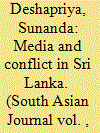

|
|
|
| 11 |
ID:
088696
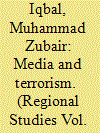

|
|
|
| 12 |
ID:
131283
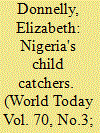

|
|
|
| 13 |
ID:
109564
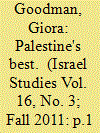

|
|
|
|
|
| Publication |
2011.
|
| Summary/Abstract |
Against the background of the currently contentious issue of attitudes towards Israel and Zionism in the international media, this article sheds light on the Jewish Agency's press and propaganda work in Palestine and abroad during two crucial years leading up to the establishment of the state of Israel. Previously unexplored, the Agency's media activity, mainly directed towards the Anglo-American press and run by a group of exceptionally talented individuals, was eventually regarded as a most effective propaganda tool in Palestine and abroad during the Zionist political and insurgent conflict with the British Government and mandatory authorities. External circumstances and appropriate Jewish Agency policies overall, also contributed significantly to the success of the press work in gaining international legitimacy and media support during that period.
|
|
|
|
|
|
|
|
|
|
|
|
|
|
|
|
| 14 |
ID:
123309
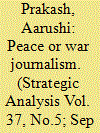

|
|
|
|
|
| Publication |
2013.
|
| Summary/Abstract |
Analysing peace journalism is a difficult task, especially within the context of an ongoing conflict. This study looks at peace journalism as it relates to the Balochistan/Pakistan conflict. Balochistan is a Pakistani province that makes up a large part of the country and is rich in natural resources. The Pakistani government has employed a policy of resource exploitation in the province, withholding any due share of profit from the Baloch. The conflict, which has been ongoing since the partition of India, has increasingly become a subject of debate in both the Pakistani and the international media, especially since the US Congress passed a non-binding resolution in favour of Balochistan's right to self-determination. This research study examines the extent of peace journalism in both the traditional and social media in Pakistan since the congressional resolution. The content analysis uses a sample of 100 articles drawn from four Pakistani newspapers, as well as 1,000 tweets from various relevant Twitter users. Using models derived from Galtung and built upon by Lynch and McGoldrick, this study reflects an apparent display of peace journalism in the working timeframe from various different sources.
|
|
|
|
|
|
|
|
|
|
|
|
|
|
|
|
| 15 |
ID:
114833
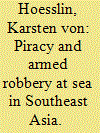

|
|
|
|
|
| Publication |
2012.
|
| Summary/Abstract |
Piracy and armed sea robbery in Southeast Asia remains very much alive and active despite its reduction in the international media spotlight since the dramatic proliferation of hijackings off the Horn of Africa. Although some littorol states have made significant successes in capturing and prosecuting pirates and gang robbers, the maritime crime continues to outpace law enforcement initiatives. Piracy and armed sea robbery in the region therefore remains highly fluid and dynamic. This article focuses specifically on piracy and armed robbery in the Singapore Strait as well as the southern South China Sea examining seasonal patterns, trends and modus operandi, as well as the criminal syndicates behind the incidents.
|
|
|
|
|
|
|
|
|
|
|
|
|
|
|
|
| 16 |
ID:
125941
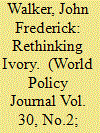

|
|
|
|
|
| Publication |
2013.
|
| Summary/Abstract |
TSAVO WEST, Kenya-Two years ago, in what was billed as a defiant message to elephant poachers, Kenya's President Mwai Kibaki arrived by helicopter at a dusty airstrip in Tsavo West National Park to set fire to five tons of seized contraband ivory.
A military band in crisp khakis blared out anthems and marches, mostly on key, traditional dancers stomped energetically, and a series of government officials introduced each other at length in the lead-up to the president's speech. It wasn't easy to hear them over the dry wind that whipped through the flapping tents sheltering hundreds of guests on rows of plastic chairs, but a local politician got rapt attention and applause when he complained about lack of protection from crop-raiding elephants. His plea delivered a mixed message at an event aimed, Kibaki intoned, at sending "a clear signal to poachers and illegal traders." But elephant conservation is never simple.
|
|
|
|
|
|
|
|
|
|
|
|
|
|
|
|
| 17 |
ID:
111952
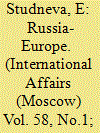

|
|
|
|
|
| Publication |
2012.
|
| Summary/Abstract |
"IT WILL LARGELY DEPEND upon the professionalism of journalists and their respect of ethical principles whether mass media will help to consolidate peace and find balanced and mutually acceptable ways of overcoming crisis situations or, in contrast, incite people to confrontation and violence." These were the words of Russian Foreign Minister Sergei Lavrov in his opening address at the international conference "Russia-Europe: Topical Issues in Contemporary International Journalism" that took place in Paris on November 24-25, 2011.
Lavrov's address expresses the gist of the discussion that took place at the conference among heads of leading Russian and international media, directors of European institutes in the humanities, Russian and European government officials, and well-known journalists from international media.
|
|
|
|
|
|
|
|
|
|
|
|
|
|
|
|
| 18 |
ID:
112121
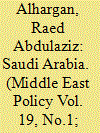

|
|
|
| 19 |
ID:
118274


|
|
|
|
|
| Publication |
2013.
|
| Summary/Abstract |
Just as Mexico has shown signs of an upswing, Brazil seems to be facing mounting difficulties.
|
|
|
|
|
|
|
|
|
|
|
|
|
|
|
|
| 20 |
ID:
132804
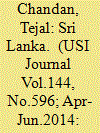

|
|
|
|
|
| Publication |
2014.
|
| Summary/Abstract |
Since the end of the war in Sri Lanka in May 2009, the discourse on Sri Lanka has largely revolved around the country's human rights record and the Government's attempts at redressing Tamil grievances. Revelations in international media about the scale of human rights violations during the last phase of the military operations against the Liberation Tigers of the Tamil Eelam (LTTE) led to mounting international pressure on Sri Lanka for accountability of war crimes. The Sri Lankan Government (SLG), in turn, made efforts to address the issues of resettlement of Internally Displaced Persons (zDPs) and the economic development of war affected zones in the Northern and Eastern Provinces of the country. President Mahinda Rajapakse also constituted the Lessons Learnt and Reconciliation Commission (LLRC) to recommend measures to address the Tamil problem and framed a National Action Plan (NAP) to implement its recommendations. However, key Tamil grievances, related to the devolution of power, remained largely neglected. Attempts at fixing the accountability for human rights violations were also half-hearted. This was evident in the widely publicised Army Court of Inquiry, appointed to investigate allegations of war crimes, which eventually absolved the Army of any wrong- doing'. This in turn, shaped the international opinion on the SLG's willingness to resolve the Tamil problem. Today the prospects for
reconciliation in Sri Lanka are linked to certain key issues. These include (i) Action related to human rights accountability, (ii) Resumption of dialogue between the main Tamil Party, Tamil National Alliance (TNA), and the Government on finding a political solution to the Tamil grievances and, (iii) Preventing the rise of religious intolerance in the country. The contemporary issues with regard to these aspects are discussed in this paper.
|
|
|
|
|
|
|
|
|
|
|
|
|
|
|
|
|
|
|
|
|